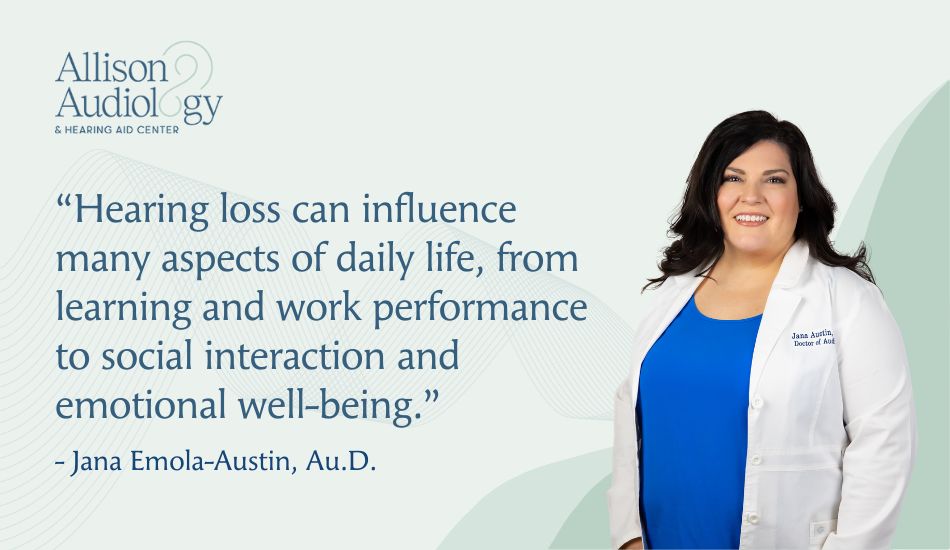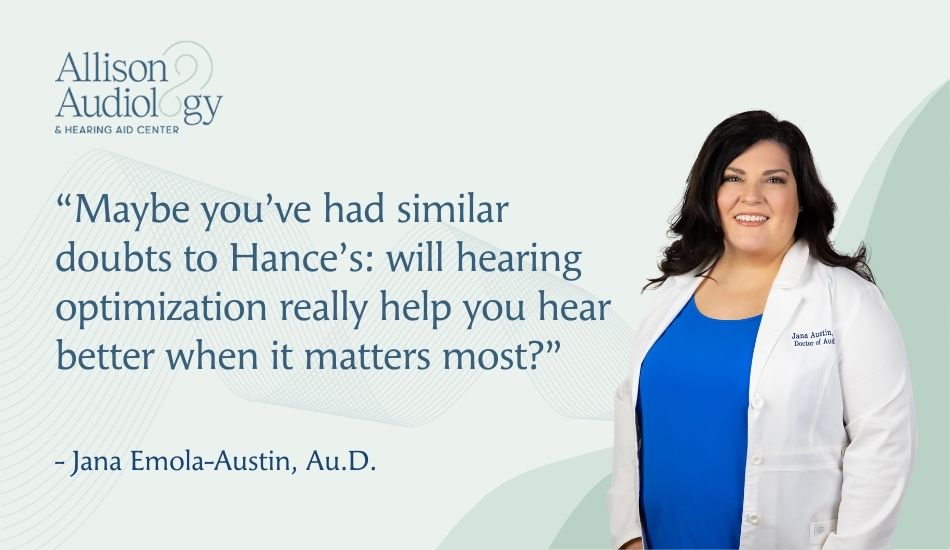Early Action Matters: Protect Your Hearing and Well-Being
Another alarming statistic shows that individuals who have already begun to experience hearing loss wait an average of seven years before scheduling a hearing test.
While they wait, additional damage and the severity of a condition increase as do other negative mental and physical health conditions, affecting relationships, productivity, and their quality of life.
The only way to be sure about whether your hearing has or continues to deteriorate is to measure it with a comprehensive hearing assessment by a hearing expert at Allison Audiology and Hearing Aid Center.
Frequently Asked Questions About Hearing Assessments
What Happens During a Hearing Assessment
01
A Warm Welcome
Whether it’s your first time in our office or you’re an old pro, our friendly staff will welcome you and help make you comfortable while you wait for your audiologist.
02
A Friendly Conversation
Your hearing specialist will ask questions and engage you in a conversation about your occupation, lifestyle, and hobbies, as well as information about your medical history and family history, which helps us understand your risks for ongoing threats and underlying causes of hearing loss. You’ll also have an opportunity to express your concerns and ask questions regarding the hearing challenges you are experiencing and our practice.
03
A Look into Your Ears
Following our conversation, your audiologist will do a health check of your ear canal using an otoscope, which is a magnifying glass with a tapered tip and a light on the end. Some of our patients discover that a bug, wax buildup, or some other obstruction in the ear canal is all that’s wrong with their hearing and can be solved with a good cleaning or minor procedure.
04
Diagnostic Testing
Our diagnostic evaluation assesses what sounds you can hear and at what volume levels you can hear them, as well as how well speech can be understood in a quiet or noisy environment. Additional testing is often necessary in order to pinpoint the specific type of hearing loss and level of severity. Testing can include any or all the following:
Pure-tone audiometry: This test determines the quietest tones you can hear at different frequencies, both for air and bone conduction.
Speech audiometry: This evaluates how well you can hear and understand speech at different volume levels.
Tympanometry: This test checks the condition of the middle ear and mobility of the eardrum.
Acoustic reflex testing: This measures the involuntary muscle contractions of the middle ear, helping to pinpoint the location of the hearing problem.
Otoacoustic emissions (OAEs): This test checks for sounds produced by the inner ear in response to stimuli, which can indicate inner ear health.
Auditory brainstem response (ABR): This test checks how the auditory nerve and brain respond to sound, which can help diagnose neural hearing disorders.
These tests help our audiologists accurately diagnose your hearing condition and develop an appropriate treatment plan tailored to your specific needs.
05
Tympanometry
A tympanometry is an evaluation of the middle ear. Negative pressure occurs in your ears whenever you have allergies, a cold, or fluid behind the eardrum. Like with the otoscopy, you’ll just sit still and relax while your audiologist performs the examination, which will include a short burst of air into your ear canal.
06
Pure Tone Audiometry
Establishing your hearing thresholds, or the softest and loudest sounds you can hear at various frequencies, requires a pure tone audiometry. For this test, your audiologist will seat you in a soundproof booth and fit you with a set of headphones.
You’ll be asked to respond each time you hear the tones transmitted through your headphones. This test not only helps identify specific ranges of hearing loss, but also provides data we use to program your hearing aids, if they are necessary to help you hear better.
07
Word Recognition Testing
In place of tones, your audiologist will transmit spoken words at various pitches and volumes through your headphones during word recognition testing. You will repeat or respond to whatever you hear in order to help determine how well you understand speech.
This test will include the transmission of background noise along with speech in order to simulate a real-world hearing environment. Along with determining the degree of hearing loss you’re experiencing, the test will help predict how well your ears will perform with amplified speech.
08
Bone Conduction Testing
A bone conduction vibrator is the headband used for the bone conduction test. It allows your audiologist to bypass the hearing pathway and transmit sounds directly to the inner ear, or cochlea, helping to rule out or confirm sensorineural hearing loss.
09
Otoacoustic Emissions
Otoacoustic emissions, or OAEs, are the vibrations that occur when sound reaches the cochlea. By placing a probe in your ear and transmitting sounds, we’re able to measure these vibrations, which tells your audiologist how well the hair cells in the cochlea transmit sound signals to the brain.
10
A Discussion About Your Results
To wrap up your comprehensive hearing assessment, your audiologist will present you with the results and explain what each test means. Regardless of whether your tests indicate hearing loss, your audiologist will provide you with the various options necessary to protect or improve your hearing, such as hearing protection for work or certain activities and hobbies, changes to medications or lifestyle habits, or the need for hearing aids.
Our best practices include asking for your input during this process, because for us, the foundation of a viable hearing care partnership begins with transparency and trust.















